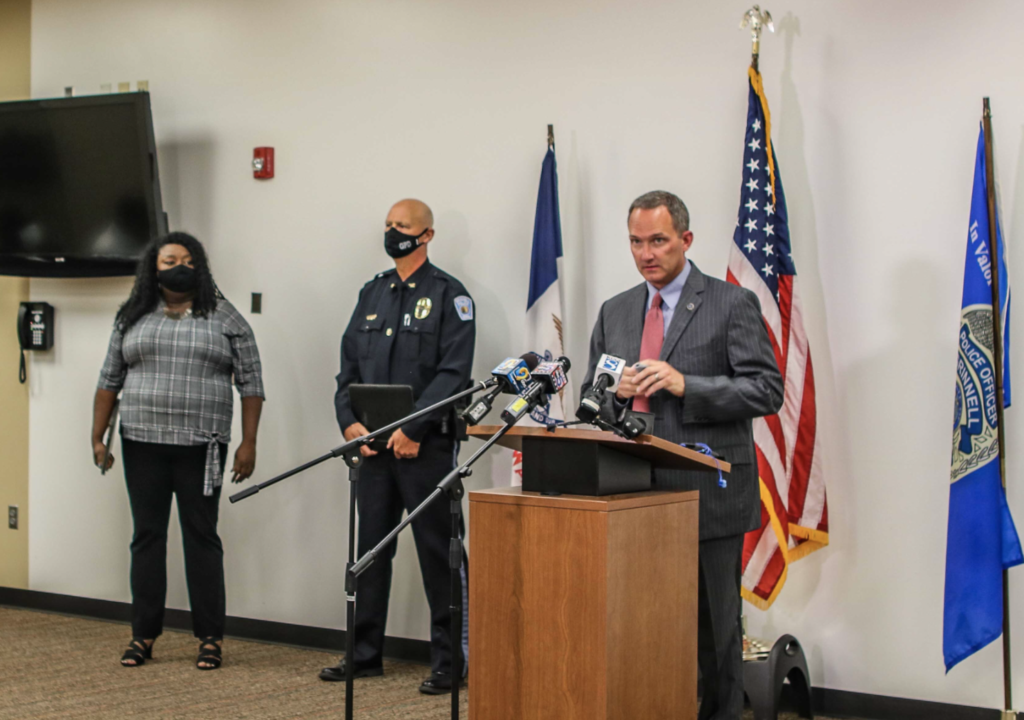According to those involved with the investigation into the murder of Michael Williams, things moved quickly after his body was found near Kellogg, Iowa, on Sept. 16.
“We were moving in the right direction pretty early on in this, and that’s important to know,” said Adam DeCamp, who was brought in from the Iowa Department of Criminal Investigations (DCI) as the Special Agent in Charge of the case.
Charges were announced against four suspects last Wednesday, just six days after the investigation began on Sept. 16.
One factor that contributed to the quick apprehension of the suspects was that Steven Vogel, the only individual accused of 1st degree murder, was already in police custody on a prior parole violation before the investigation began, according to court documents and police statements.
Another factor that helped determine the speed of the investigation was the amount of resources allotted to it.
Iowa has a policy of “municipal home rule,” which means that the jurisdiction to conduct a criminal investigation rests primarily within the locality where that crime was committed. Since Michael Williams’ body was found in Jasper County, the Jasper County Sheriff’s office had initial authority. One of their first actions was to seek the assistance of the Iowa Department of Criminal Investigations, a request-only division of Iowa law enforcement which helps augment local police forces and bolster their investigative capacities.
“We do not come in and forcefully insert ourselves into investigations,” said DeCamp. “Jasper County sheriff’s office requested DCI, because we provide expertise, but also because we provide manpower and resources at no charge to the local agency.”
DeCamp estimated that between 10 and 12 DCI agents and criminalists contributed to the case. DCI also helped process evidence at its criminalistics lab.
In addition to DCI, dozens of law enforcement officers from Poweshiek, Jasper and neighboring counties worked on the case. Iowa state patrol and the state drug task force also contributed officers and resources. In total, DeCamp estimated that over 50 officers worked on the case. For reference, Grinnell Police Department has 14 officers when fully staffed.
In the state of Iowa, a typical homicide investigation generally involves between 12 and 16 officers, according to DeCamp. “The resources allocated to this investigation were very significant,” said DeCamp. He continued, “The number of hours that have been put in on this investigation, I can’t even tell you.”
From an early stage, DeCamp said that DCI and other elements of law enforcement worked to be as transparent as possible with the local community. Although officials stated at Tuesday’s press conference that they did not believe race was a contributing factor in the homicide, they still considered its implications.
“In a case like this,” said DeCamp, “we acknowledged early on that it could potentially receive national attention, but [that] it was definitely going to receive local attention. And so what we did is we made the conscious effort to reach out to members of the Black community, through the NAACP, to provide them the information, because we believe that transparency is paramount.”
The number of hours that have been put in on this investigation, I can’t even tell you. – Adam DeCamp
As the investigation moves into its next stage, the focus will shift to building a successful case against the four individuals suspected of taking part in or aiding the murder. Given the severity of the charges, particularly against Vogel, it’s likely a verdict could still be a long way away.
The trial of Cristhian Rivera, who is facing similar charges to Vogel for the 2018 murder of Mollie Tibbetts in Poweshiek county, will not see its first court date until 2021.
Although every criminal defendant in Iowa has the right to a trial by their peers within 90 days of being charged, this right is often waived in homicide cases as both sides seek to build the strongest case possible.
“I would say my experience tells me it is more likely to take 10 months or longer before a case sees a [trial],” said DeCamp, “Especially because of the severity of this.”

























































